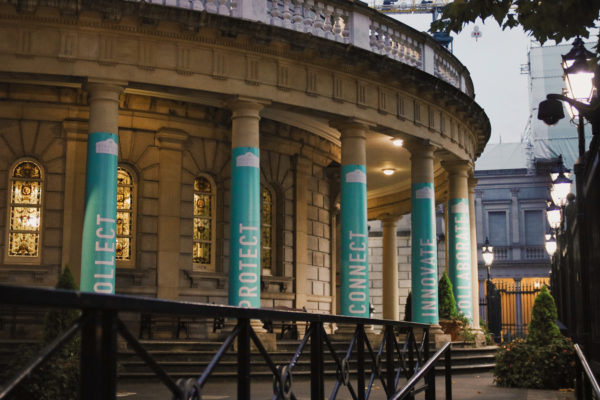
Last night, the National Library commemorated Seamus Heaney with A Holding Field, a multimedia presentation dedicated to the late poet. The topic at hand was Heaney’s work in translation – work that not only explored the boundaries between cultures and languages, but reimagined poetry’s importance in modern times. The leaflet promised a night of readings and discussion from five respected Heaney scholars.
The aura of multilingualism was palpable in the National Library, as Gaelgóirí gabbled away behind me. All conversation was soon silenced by the first topic: Heaney’s translation of the Irish epic Sweeney Astray. In a series of re-enactments, three Heaney scholars attempted to breathe life into Heaney’s translated verse, reciting lyrical laments and bloody battles with theatrical bombast. Astonishingly, this method was continued for the duration of the evening as the professors-turned-actors shifted from oral portrayals of Irish and Anglo-Saxon epics to Dante’s Divine Comedy and the lyric poems of recent Polish writers. The climax of this was undoubtedly Stephen Regan’s stirring performance of a speech from The Burial at Thebes.
Apart from the refreshing way in which the poems were presented, there were deep discussions about the ways in which cultural incidents from the 1960s to the 2000s informed Heaney’s poetic interpretations. Regan and Michael Parker demonstrated Heaney’s inimitable ability to translate poems from different nations and times into the world that surrounded him. Heaney’s translations of the torture in Dante’s Inferno disguised protests against the inhumane treatment of H-Block internees, and while George Bush informed the world that all nations were either “with us or against us”, Heaney re-adapted the absolutist rhetoric of Sophocles’s mythical creation, Creon. Light was also shed on Heaney’s relationship with Czeslaw Milosz, a poet whose work inspired translation as well as the belief that art can transcend oppression.
Perhaps the most poignant segment of the evening was a filmed interview between Esther Armstrong and Rachel Falconer, which focused on Heaney’s relationship with Virgil, the Ancient Roman poet. Belfast and Iraq seemed distant as Falconer cited Heaney’s final work of translation — Book VI of Virgil’s Aeneid — as a profound meditation on poetry’s ability to communicate with the afterlife. Falconer remarked that, while engaging with Virgil’s depiction of the underworld, Heaney was capable of “descending into the memory of culture” and walking alongside ancient myths. Meanwhile, Heaney’s poetic journeys into the afterlife as an older man offered memories of “an idyllic past”, one in which he could catch glimpses of an innocent childhood or rekindle friendships long divided by the grave.
It is intriguing to consider what poetry Heaney might have been translating in 2018. Heaney’s death has left an aching gap in the poetic world, a world that increasingly needs the insight, lexicon and wit of a great translator. His legacy demands that we constantly reappreciate and reimagine our poetic heritage. With Britain unmooring itself from Europe and straining an ever-tenuous relationship with Ireland, it is perhaps time that Irish mouths unshackled themselves from the English tongue and sought poetic inspiration further afield.






